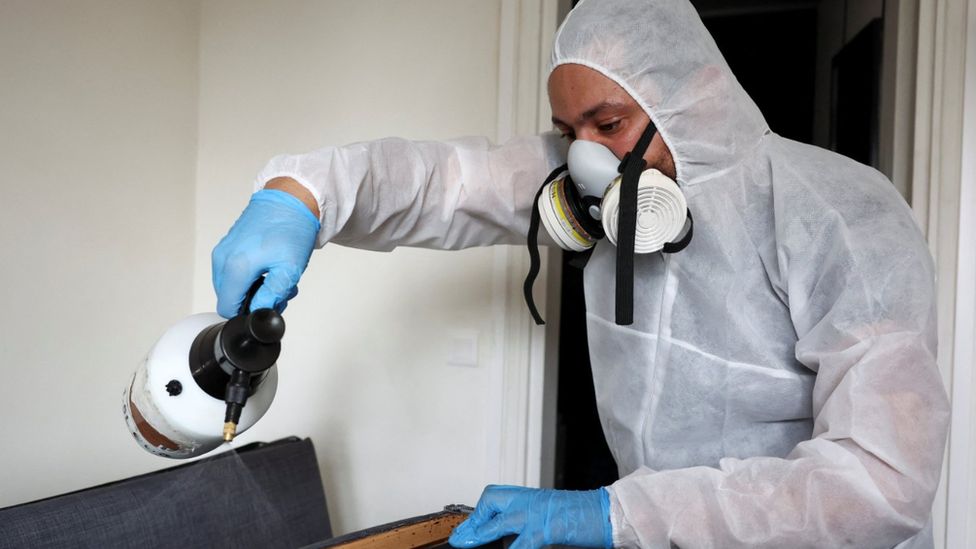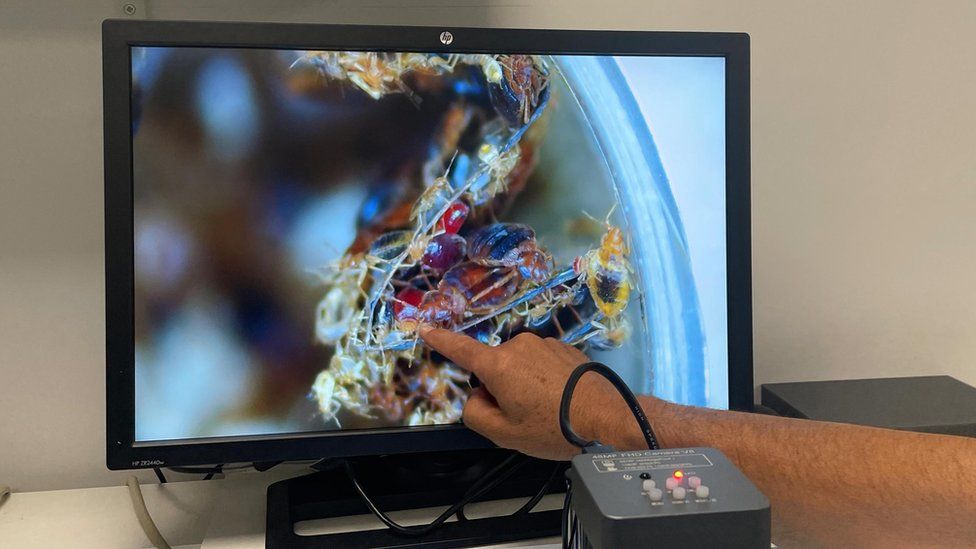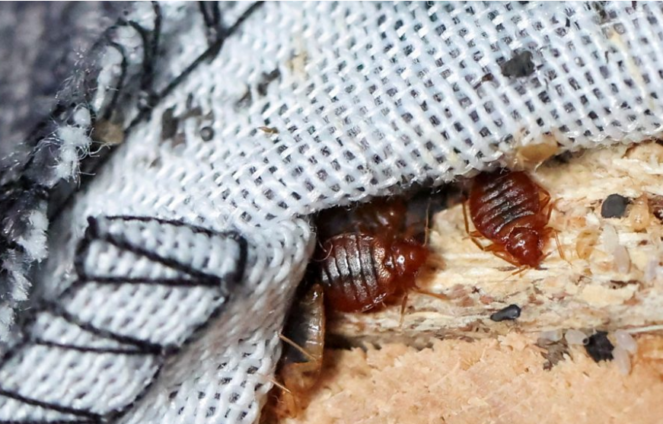A plague of bedbugs has hit Paris and other French cities, provoking a wave of insectophobia and raising questions about health and safety during next year's Olympic Games.
That's broadly how the phenomenon has been described in the French - and now international - news media.
In part it is true. But in another part, it isn't.
What is the case is that the number of bedbug sightings has increased over the last weeks - and that that upward trend goes back several years.
"Every late summer we see a big increase in bedbugs," says Jean-Michel Berenger, an entomologist at Marseille's main hospital and France's leading expert on les punaises.
"That is because people have been moving about over July and August, and they bring them back in their luggage.
"And each year, the seasonal increase is bigger than the last one."
In Paris, the long-standing fear of infestation felt by flat-dwellers (one in 10 of whom have experienced bedbugs in the last five years, according to official figures) have been added new sources of angst.
Reports that punaises have been recently seen in cinemas have not been proven, but are taken seriously. Likewise claims that people have been bitten on trains.
And now both Paris City Hall and the President Emmanuel Macron's government are calling for action. It is a measure of how seriously they take the issue - and of how they need to protect the image of Paris ahead of the 2024 games - that they are not dismissing the bedbug panic as a social media invention.
Because that is also part of the story.
Scare stories are flashing across the internet so fast that they are turning what was once for newspapers a reliable slow-day chestnut into a national emergency.
Cinema-owners - already worried about declining attendance - are seriously spooked when videos circulate showing unidentified mites on a seat. People on metros have started checking their upholstery. Some prefer to stand.
"There is a new element this year - and that is the general psychosis which has taken hold," says Mr Berenger.
"It is a good thing in a way because it serves to make people aware of the problem, and the sooner you act against bedbugs the better.
"But a lot of the problem is being exaggerated."

REUTERS
The fact of the matter is that bedbugs are making a comeback, and have been for perhaps 20 or 30 years. But that is not just in France, but everywhere.
There are several factors, of which globalisation - container trade, tourism and immigration - is the most important. Climate change can be ruled out. The bedbug - cimex lectularius to give its Latin name - is a domesticated creature. It goes where humans go. Weather doesn't come into it.
After World War Two, bedbugs - like many other beasties - were massively reduced in number by the widespread used of DDT. But over the years, DDT and many other chemicals have been banned because of their effect on humans.
And in the meantime, the bedbug population has been altered by the elimination of those creatures who were genetically susceptible to chemical eradication in the first place. Those that survived the DDT blitz are the ancestors of today's breed, who are as a result far more resistant.
A third factor may be the decline in cockroaches, thanks largely to cleaner homes. Cockroaches are a bedbug predator. Fear not: no-one is suggesting reinfesting homes with cockroaches in order to deal with les punaises!
According to Mr Berenger, in the developed world, people are liable to panic about bedbugs because we have lost the collective memory of them. In other parts of the world, they are still common - and people keep the threat in proportion.
The truth is that bedbugs are indeed a menace - but the danger is more psychological than physical. Cimex lectularis may be revolting, but as far as is known it cannot transmit disease. Its bites are loathsome, but they do not last very long.
It sheds its exoskeletons at regular intervals; it leaves faeces in the forms of black dots (digested blood); it wiggles in delight at the scent of a human; and it can last for a year without food. All horrors to contemplate.

But the real damage is to an infestee's mental health.
A year ago, my 29 year-old son found bedbugs in his flat in the 20th arrondissement. He threw out his bed; washed all his clothes; scrubbed the place from top to bottom. But still he could not sleep. He began imagining things crawling over his skin. It became an obsession.
Only after an expensive steam-treatment of his flat by a respected anti-pest company was he able to breathe again. Some pest-controllers use sniffer dogs to track them down.
"Having bedbugs is no laughing matter," says Berenger. "But there are a lot of far-fetched stories out there, about how easily they can spread from A to B.
"In my view the way to tackle bedbugs is not to target everyone - but to go for superspreaders."
These are the people, he explains, who though few in number do most of the damage. They are often marginalised, poor, mentally ill, and with little access to social services.
When called to a superspreader flat, he and his team find truly revolting spectacles - hundreds of bedbugs crawling over each other, in clothes, in the floorboards, behind pictures. Eggs are everywhere too.
"Every time one of these people leaves his or her home, they are spreading bedbugs. They are the ones that need help."
Latest Stories
-
World Menstrual Hygiene Day: ofi distributes reusable sanitary pads with impactful celebrations at Konongo-Odumase SHS
37 minutes -
Ukraine and Ghana to deepen cooperation in cybersecurity and digital innovation
39 minutes -
Daily Insight for CEOs: Data-driven decision-making – A CEO’s edge in uncertainty
50 minutes -
This Saturday on Newsfile: GH¢1 fuel levy and OSP declaring Ofori-Atta wanted again
1 hour -
Mahama announces steps to improve Islamic education nationwide
2 hours -
Eidul al-Adha: Drugs worse than alcohol – Imam Suleman warns Muslim youth
2 hours -
Fuel Levy: What crime have Ghanaians committed? – Dr Amin Adam questions gov’t
3 hours -
Postecoglou sacked by Spurs after Europa League win
4 hours -
Employee fraud is everywhere, be intentional about stopping it – Expert counsels
5 hours -
We have a very good chance of making it to the World Cup – Jordan Ayew
5 hours -
Innovation Hubs as Engines of Sustainability: Charting Ghana’s path with lessons from the Hamburg Sustainability Conference 2025
5 hours -
UHAS makes history with publication of landmark study in Nature Human Behaviour
6 hours -
Asante Gold Corporation commended for community development projects in W/N region
6 hours -
World Environment Day: Stakeholders urge collaborative effort for sustainable ecosystem restoration
6 hours -
Photos: Thousands of Muslims observe Eid al-Adha 2025 at Independence Square
6 hours

